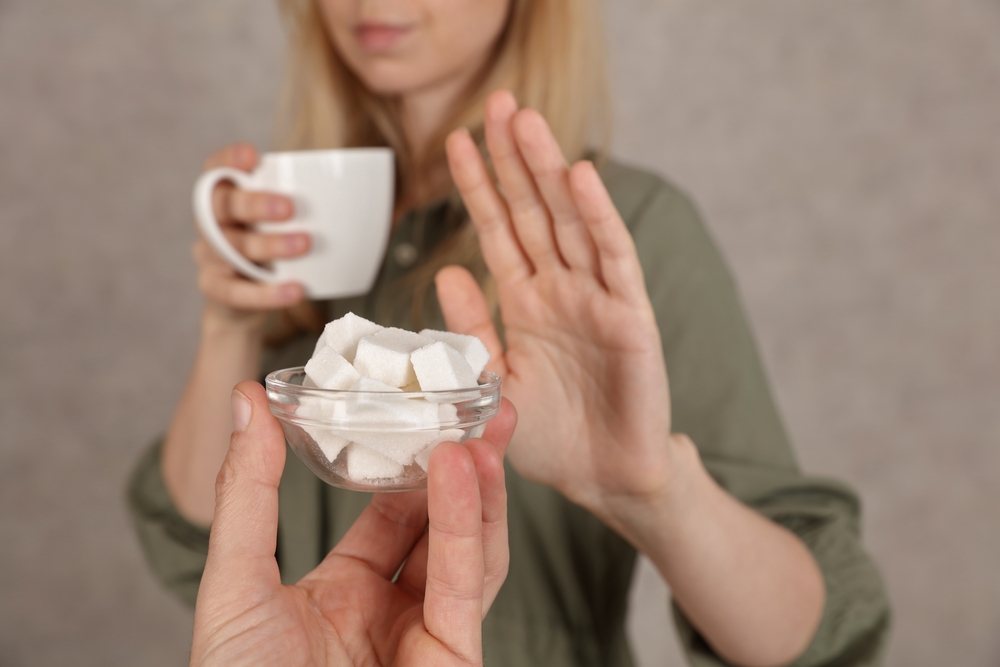Ditching sugar and adopting a low-sugar lifestyle can transform your health and prevent diabetes. Here are practical tips to eliminate sugar from your diet.
When it comes to reducing sugar intake in the food, it’s the unsuspected edible items that often pose a challenge in adopting a low-sugar diet. The culprit could be the seemingly harmless ketchup or seasoning that you are using to flavour your food or the instant oatmeal that hides loads of sugar. In order to reduce the daily sugar intake, one must be aware of the amount of hidden sugar we are consuming every day and find suitable alternatives to the foods that are too sugary and increasing your risk of obesity. You may start by ditching sugar in your daily coffee or giving up the aerated drinks that are bursting with sugar, and then slowly replace all your creamy and sugary treats with fruit and other natural sugar-based desserts. Tweaking your diet to include more protein in your meals can also help curb your sweet cravings and eliminate sugar.
“Sugar has taken centre stage in the modern diet, with a presence in a wide variety of food items, including main dishes, savoury items, and desserts. The recommended amounts of sugar that adults can consume daily should be at most 30 grams, while children could consume up to 24 grams. Consuming sugar higher than the recommended units or 10 percent of the total calories consumed may cause obesity and increase the chances of developing diabetes. Limiting sugar intake is the most proactive way to reduce sugar-associated health risks,” says Dr Dakshata Padhye, Preventive Diabetologist, Conquer Diabetes Center.
Dr Padhye shares some practical tips to help you adopt sustainable lifestyle changes, satisfy your cravings, and swap the hidden sugar sources with healthier options.
1. Choose healthy beverages
Drinking water is highly recommended. Although you may crave sweet beverages from time to time, avoid processed drinks like sodas and energy drinks. Swap aerated drinks with fruit smoothies, herbal teas, unsweetened coffee, and vegetable juices. Skim milk, thin buttermilk, sattu drink, aloe vera shots and coconut water should be your top hydration choices.
2. Limit condiment use
Adding condiments to your dishes is a great way to enhance flavour. However, most condiments, such as ketchup, sauces, pickles, vinegars, herbs, spices, seasonings, etc. contain unhealthy ingredients like artificial flavours and colours and excessive amounts of added salt and sugar and thus should be avoided or limited in use on a regular basis.
3. Eliminate sugary desserts
All desserts are loaded with sugar and provide nothing of nutritional value. They cause blood sugar to spike while leaving you tired and hungry for more sugar. You can include low-sugar desserts like 70 percent cocoa dark chocolate, baked fruit with cream, and yogurt with spices like cinnamon, nutmeg, etc., to satisfy your sweet tooth.
4. Read food labels
Processed and canned food items contain added sugar, so you must check food labels. The ingredients are all listed in order of quantity, and the higher the sugar is on the list, the less it should make it to the cart. A tip is for you to avoid products that have sugar or sugar synonyms, like sucrose, maltose, dextrose, fructose, glucose, lactose, etc.
5. Add more protein
A high protein and fibre diet offers many health benefits, including reducing hunger and promoting satiety, while a high sugar diet is linked to increased appetite and weight gain. It is easy for you to increase protein intake with minor changes in the diet, such as filling one-fourth of the plate with protein-rich foods like lean meat, eggs, pulses, and legumes.
6. Take small steps
All choices you make about what you eat and drink matter. It is essential to have a balanced, nutritious diet. Limit stocking the home pantry and fridge with high-sugar foods. Stock up on millet and healthy snacks to reduce the sugar content in your diet. Also, it is essential to remember that sugar-free doesn’t mean calorie-free.
“Reducing and eventually eliminating sugar can be challenging but essential for people with diabetes or those looking to improve their health. These simple, practical tips can significantly reduce sugar intake while satisfying your cravings. However, remember to take it slowly, celebrate every little milestone, and never give up on your progress. If you have a cheat day, enjoy that one meal, and then push yourself not to slip up again and continue the effort to benefit your health,” says Dr Padhye.






